By
Looking Ahead
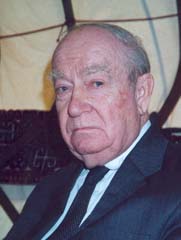 In all my fifty-two years in publishing there’s never been a quiet moment, there’s never been an easy moment, there’s never been a moment when I haven’t been worried to death, one way or another. Writing my autobiography has given me the opportunity to reflect on everything I’ve been involved in – I’ve managed to find humour in situations that were catastrophic at the time. I suppose I’ve always courted danger. Some instinct has driven me to it. I recently opened a bookshop in London and I have the most inspired bookshop manager, John Cairney, whose last job was running John Smith’s Glasgow, Byers Road branch.
In all my fifty-two years in publishing there’s never been a quiet moment, there’s never been an easy moment, there’s never been a moment when I haven’t been worried to death, one way or another. Writing my autobiography has given me the opportunity to reflect on everything I’ve been involved in – I’ve managed to find humour in situations that were catastrophic at the time. I suppose I’ve always courted danger. Some instinct has driven me to it. I recently opened a bookshop in London and I have the most inspired bookshop manager, John Cairney, whose last job was running John Smith’s Glasgow, Byers Road branch.
Being a publisher is not something I set out to do but I always had a literary bent. At every school I went to I ended up editing the school magazine. I was a poet when I was a young man, published occasionally in literary magazines. Then a friend who had been in publishing suggested that if I put up £500, with my money and his knowledge we could start a publishing company. But after we had been in business for a few months he gave me a novel to read which was obviously by him – he wouldn’t admit it, but it was. I felt we couldn’t publish anything of our own at that stage. We argued, he quit the partnership and I carried on my own.
I’ve spent about half my time in publishing travelling around selling my list to booksellers in just about every country in the world. Nowadays some of the big chains don’t allow their staff to buy books from reps at all, which is just plain stupid – booksellers who are good at buying books are also good at selling them and if you don’t allow people to develop as booksellers, you end up with a shop full of dross.
Even now it’s possible for a motivated publisher to get through. Going into publishing isn’t likely to make you rich, you have to sacrifice a lot of time, be able to do everything yourself and be willing to travel to sell your books – and if you know your own books you can sell them. Publishing is about more than getting a return on an investment or being fashionable. Publishers have a chance to contribute to making a better world. I recently published Jeff Nuttall’s Art and the Degradation of Awareness, in which says ‘Art gives out of courage; fashion takes out of fear.’ Most of the ‘art’ we hear about today is fashion driven by commerce. Money is just a means of exchange, a means of keeping a roof over your head and all that, but to pursue wealth for its own sake is decadent. I agree with Samuel Beckett that one has to teach oneself not to want things. One wants many things for no better reason than that advertisers train us to want them.
One of the most important aspects of being a publisher is the contribution you can make to cultural life. Freedom of thought and action is something I hold dear. I believe we should be creating a culture where people are taught a sense of responsibility – that kindness is good, generosity is good, making other people happier or less miserable is good – rather than one in which you’re taught to grab as much as you can and to hell with everybody else. These attitudes have set us back and made people ashamed to be generous – but no one should be afraid to say that it’s better to think about people other than yourself. This way you yourself will be better, you’ll be more comfortable with yourself – you’ll be able to meet your own eyes in the mirror.
On Samuel Beckett
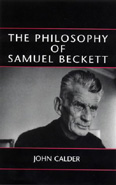 My relationship with Samuel Beckett began when I saw Waiting for Godot in London. I wrote to him offering to publish the play and, he telephoned me to say Godot was already with Faber, but I should visit him next time I was in Paris. I did just that. We had dinner together, got on very well and talked until eight the next morning. That happened almost every time I saw him for the next few years – we’d stay up late in cafes, drinking beer or coffee, playing billiards or chess, and talking. We had so much in common. I had the opportunity of publishing all of Beckett’s novels and was always in very close contact with him. We had a wonderful relationship which went on until he died in 1989.
My relationship with Samuel Beckett began when I saw Waiting for Godot in London. I wrote to him offering to publish the play and, he telephoned me to say Godot was already with Faber, but I should visit him next time I was in Paris. I did just that. We had dinner together, got on very well and talked until eight the next morning. That happened almost every time I saw him for the next few years – we’d stay up late in cafes, drinking beer or coffee, playing billiards or chess, and talking. We had so much in common. I had the opportunity of publishing all of Beckett’s novels and was always in very close contact with him. We had a wonderful relationship which went on until he died in 1989.
I found Beckett very easy to work with. There was very little to edit, as he was so meticulous with his manuscripts. Occasionally I would suggest things and he would hesitate, but usually he said, ‘No, leave it the way it is.’ On one occasion I was sitting with him and asked if anything was coming along. He said ‘Well, I’ve brought you this. You probably won’t like it or be able to publish it’, and handed me a manuscript. When I got back to my hotel I discovered that I didn’t have the manuscript with me. So I phoned the restaurant and they said ‘No, there’s nothing here’. But I couldn’t think of anywhere else it might be, so I went rushing back and at four o’clock in the morning I raked through all the dustbins, bits of eggshell and so forth, and finally found the manuscript in a plastic case. With great relief I went back to my hotel and at five o’clock in the morning started reading. The text was Worstword Ho.
There are many such stories in my autobiography – things we did together, things he told me, things about him, some of them very funny, and very often things which disagree with what biographers have said about him. His official biographer doesn’t like classical music and I think he projects this dislikes onto Beckett. That doesn’t square with my experience. Beckett loved music. He also felt that he shouldn’t enjoy anything too much because if you enjoy anything too much you want to go on living and he didn’t want to put himself in a position where he was enjoying life so much that he was afraid to die.
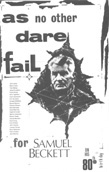 I feel that Beckett’s thinking has been misrepresented. That’s one reason I wrote The Philosophy of Samuel Beckett. At one Beckett conference in America I mentioned Beckett’s view, expressed in Worstword Ho, that one reason for human existence is that pain should exist. And ene professor actually said, ‘I can’t teach that to my students, I’d lose my job!’ There may be many people who believe that while pain surrounds us all the time it is somehow constructive to try to ignore it. Beckett doesn’t. His thinking is very close to Schopenhauer’s in this, although I think by the time he discovered him he’d already come to the same conclusions. Schopenhauer thinks that everything is caused by a kind of Will: Nature has a Will that for him is evil, the cause of suffering. Standard religions – not so much Hinduism or Buddhism – of course, deny this. Beckett asks deeply searching questions about conventional beliefs. Why should a god want to be worshipped, admired, praised? All we’re doing is replacing a parental figure with a god: Please, daddy, give me this.
I feel that Beckett’s thinking has been misrepresented. That’s one reason I wrote The Philosophy of Samuel Beckett. At one Beckett conference in America I mentioned Beckett’s view, expressed in Worstword Ho, that one reason for human existence is that pain should exist. And ene professor actually said, ‘I can’t teach that to my students, I’d lose my job!’ There may be many people who believe that while pain surrounds us all the time it is somehow constructive to try to ignore it. Beckett doesn’t. His thinking is very close to Schopenhauer’s in this, although I think by the time he discovered him he’d already come to the same conclusions. Schopenhauer thinks that everything is caused by a kind of Will: Nature has a Will that for him is evil, the cause of suffering. Standard religions – not so much Hinduism or Buddhism – of course, deny this. Beckett asks deeply searching questions about conventional beliefs. Why should a god want to be worshipped, admired, praised? All we’re doing is replacing a parental figure with a god: Please, daddy, give me this.
Beckett was one of the four great writers of the twentieth century, alongside Proust Kafka and Joyce. Proust shows us the elasticity of time, how experience of time varies from person to person or within an individual lifetime: one little incident can be so important that you keep going back to it, and then there can be whole periods where one doesn’t remember anything. Beckett learnt a great deal from Proust. With Kafka he shared the idea that humans are so unimportant in this universe, that there’s no reason why any other being should know we exist. And then from Joyce there’s the feeling for language. In a way he’s a culmination of the three.
The work of these writers underlines the urgent need for people to think for themselves and resist the pressures of an age when reliance on computers and artificial intelligence means that many people can’t even add to ten without a calculator. We’re in danger of becoming idiots and machines are becoming more intelligent. They could become the next dominant species, they may well supersede us – and I say that absolutely seriously. It’s a real possibility. It’s time people stopped fooling themselves that they’re becoming gods through technology.
On William Burroughs
There was something very strange about William Burroughs. Like Aleister Crowley, he believed he was a magician, that by playing with words he could make things happen. He was obsessed with mind 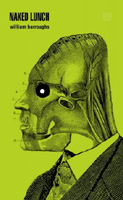 control, that there were alien beings manipulating us. He became a cult figure to a generation much younger than himself. He really had nothing at all in common with these people but he accepted their admiration and got caught up in the drugs and music culture. Eventually a James Grauerholz became his amanuensis and secretary and more or less took him over. At that stage all Burroughs wanted was to be left alone. Grauerholz installed him in a little house in Kansas where he sat all day with his typewriter. He had nine cats the last time I saw him. They brought him clean laundry, cat food, donuts and a bottle of vodka a day.
control, that there were alien beings manipulating us. He became a cult figure to a generation much younger than himself. He really had nothing at all in common with these people but he accepted their admiration and got caught up in the drugs and music culture. Eventually a James Grauerholz became his amanuensis and secretary and more or less took him over. At that stage all Burroughs wanted was to be left alone. Grauerholz installed him in a little house in Kansas where he sat all day with his typewriter. He had nine cats the last time I saw him. They brought him clean laundry, cat food, donuts and a bottle of vodka a day.
As far as editing Burroughs goes: I tried to sit down with him to discuss books but he hated looking at old work. He was only interested in what he was currently doing. I would say, ‘Now look, this man on page forty strikes me as very like the one on page sixty-six, except he has another name – could it be the same person?’ Burroughs would say ‘ Yes, you’re right. Change the name. Do what you like. This bores me.’ The English editions of the Burroughs’ novels I published read very differently from the American ones. For instance, I put The Naked Lunch into a totally different order from the American edition, which Ginsberg edited somewhat randomly. I tried to find a more logical sequence. But in the late Eighties I had to end all the contracts with Burroughs and that was that – Grauerholz wanted to cut off everything from his past. I don’t see Burroughs as a good writer but he’s an important writer. What he did during his experimental period strikes me as not so different from what T.S. Eliot was doing in ‘The Waste Land’.
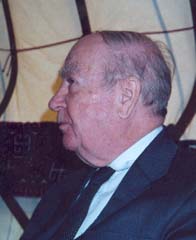 I had already staged a number of public debates between writers before the Writers Conferences of 1962 and ’63 – one was particularly amazing, between Marguerite Duras, Alain Robbe-Grillet and Nathalie Sarraute. I translated for Robbe-Grillet, Sonia Orwell for Duras; Sarraute spoke perfect English, so she spoke directly. The 1962 Writers Conference Edinburgh involved over seventy writers and is said to have launched Burroughs (Burroughs himself credits me with this in the inscription on a book he gave me: ‘To John Calder, who started off my career in Edinburgh’).
I had already staged a number of public debates between writers before the Writers Conferences of 1962 and ’63 – one was particularly amazing, between Marguerite Duras, Alain Robbe-Grillet and Nathalie Sarraute. I translated for Robbe-Grillet, Sonia Orwell for Duras; Sarraute spoke perfect English, so she spoke directly. The 1962 Writers Conference Edinburgh involved over seventy writers and is said to have launched Burroughs (Burroughs himself credits me with this in the inscription on a book he gave me: ‘To John Calder, who started off my career in Edinburgh’).
Unlike modern book festivals, which are dominated by market forces, at the 1962 event publishers didn’t have a single say. I asked them to contribute to expenses where possible, and sold them advertising in the programme if they wanted it, but I left the writers to take things where they wanted. People would give individual statements, as Burroughs did, and sometimes there would be two writers talking at the same time and then the audience would join the argument. That was where Hugh MacDiarmid and Alexander Trocchi had their famous spat. There was talk about politics, colonialism, censorship – the writer’s responsibility in the world. If the proceedings didn’t take the shape I imagined, that didn’t matter. And as my autobiography shows, life doesn’t necessarily take the shape you imagine. But the point of everything I do remains the same: to make ideas available to people, to expand their minds.
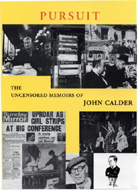 John Calder’s forebears were brewers in Alloa. As a young man he moved to London where in 1949 he embarked on a career in publishing and soon showed himself to be one of the great literary publishers. In 1970 he took over Better Books in London, later opening a branch in Edinburgh. His bookshop, Calder Books (51 The Cut, Waterloo, London SE1 8LF) is as individual and discriminating as its predecessors, stocked for ‘serious book lovers’. Pursuit: The Uncensored Memoirs of John Calder is a detailed account of the life of a truly great bookman. (Calder Publications, HBK, £24.99).
John Calder’s forebears were brewers in Alloa. As a young man he moved to London where in 1949 he embarked on a career in publishing and soon showed himself to be one of the great literary publishers. In 1970 he took over Better Books in London, later opening a branch in Edinburgh. His bookshop, Calder Books (51 The Cut, Waterloo, London SE1 8LF) is as individual and discriminating as its predecessors, stocked for ‘serious book lovers’. Pursuit: The Uncensored Memoirs of John Calder is a detailed account of the life of a truly great bookman. (Calder Publications, HBK, £24.99).
Copyright John Calder 2005.

Comments